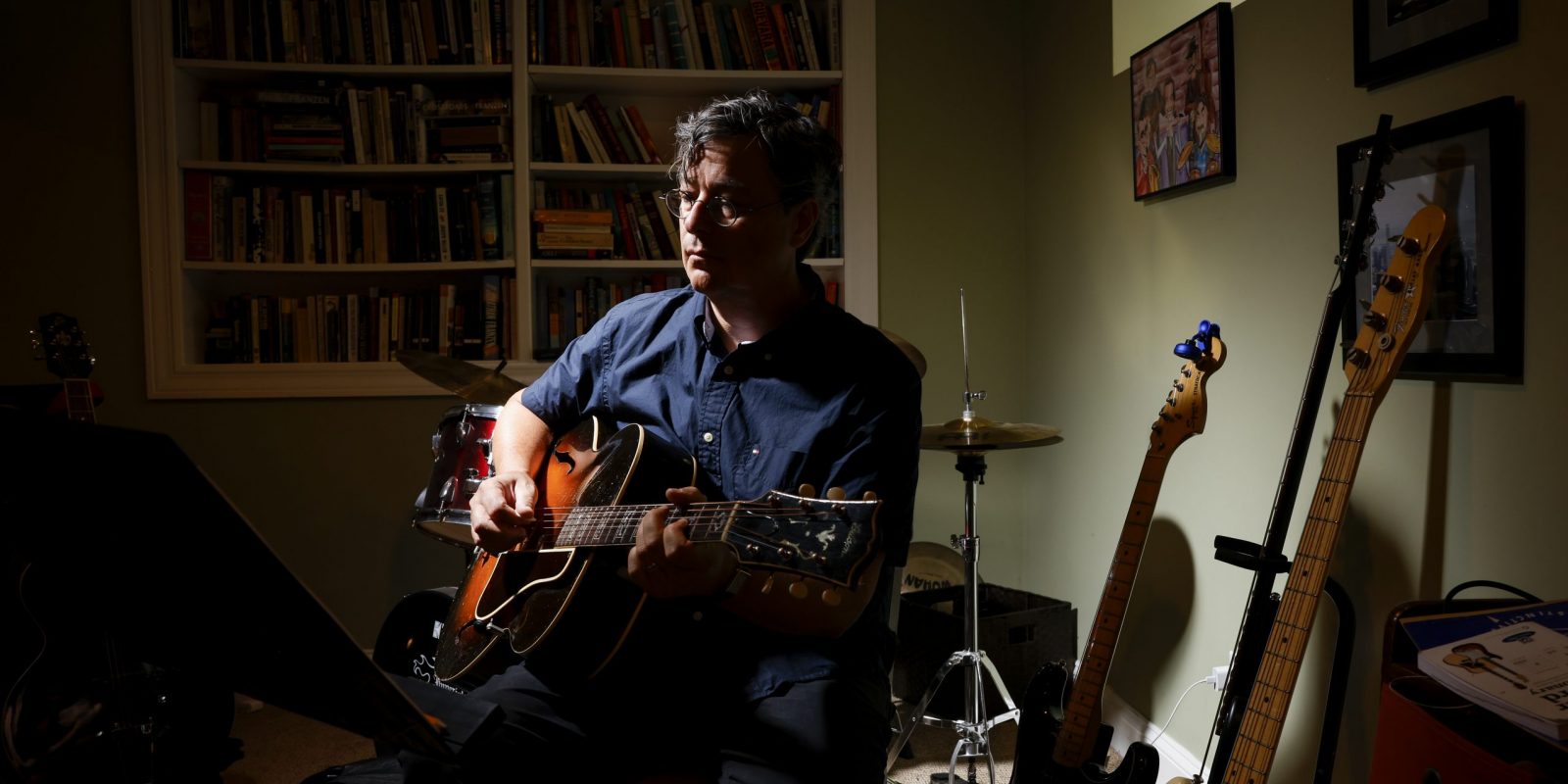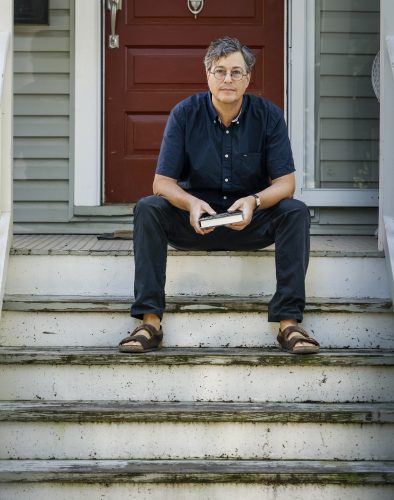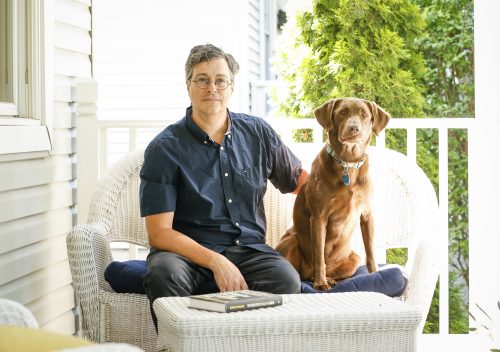
DePaul professor David Lay Williams balances political theory and jazz performance.
David Lay Williams Discovered His True Passion for Political Thought at TCU
David Lay Williams ’92 has been passionate about economic inequality for most of his career as a philosophy professor. “We can’t simply dismiss inequality as unproblematic,” he said, “as we have been doing for largely the last four decades.”
Ignorance begets an environment in which “we have really big problems on our plate,” said the loyal Horned Frog who is now a professor of political science at DePaul University in Chicago.
Since 1976, the wealth of the top 1 percent of Americans has grown by an average of $16 million per family. The top 0.01 percent has netted $85 million, and the top 0.001 percent gained an unfathomable $440 million in that time. Conversely, the less wealthy half of the country only captured $12,000 per family on average during the same timeframe. “The wealthiest 10 individuals have more than the poorest 40 percent of humanity,” Williams writes in The Greatest of All Plagues: How Economic Inequality Shaped Political Thought from Plato to Marx, his book on the matter that was published by Princeton University Press in 2024.
Williams’ career in intellectual curiosity began in misunderstanding. In high school, he admired Carl Jung and Sigmund Freud for their explorations of “ideas more so than facts.” The Police’s Synchronicity, an album co-opting Jung’s theory of the subconscious, piqued Williams’ interest in the Swiss psychiatrist. Williams conflated his passion for thought with psychology, later realizing he had been enamored with philosophy all along.
A TCU philosophy course taught by professor Gregg Franzwa, who died in 2016, led to a realization: “That stuff that I liked about my high school psych class, that’s actually what we now call philosophy,” Williams said. “I felt like I had a true passion. And that’s when I resolved to be a professor.”

David Lay Williams draws on decades of philosophical study to challenge today’s conversations about wealth and fairness.
In his PhD studies, Williams negotiated both political science and philosophy. He devoted his mind to literature, art and an overall compulsion to “make myself a well-rounded intellectual.” His time at TCU “whet my appetite for learning.”
Charles Lockhart, who taught political science at TCU from 1974 to 2014, had a major hand in shaping Williams’ thinking and career. Lockhart gave Williams “special assignments,” including a paper on the political philosopher John Rawls, to introduce the then-undergraduate to challenging ideas.
Lockhart’s recommendation to one of his own mentors at the University of Texas led to Williams’ admittance to a PhD program.
Williams landed a faculty role at DePaul in 2011 and earned his way to tenure, at which point he turned his ambitions to writing The Greatest of All Plagues, which he calls the great work of his career.
Lockhart encouraged Williams to tackle economic inequality, a concept he called “the elephant in the room. … Most philosophers who are in this field had tacitly acknowledged that you couldn’t have a democracy or a representative government when there was too much economic inequality.”
Echoes Through Time
The Greatest of all Plagues is the culmination of a decade of effort. Combining Williams’ dovetailing interests, the book braids wisdom from canonized philosophers about economic inequality.
“I wanted to spend that time with thinkers that I really cared about, people that in most cases I’ve been teaching for a very long time,” he said. Featured in the 403-page book are Plato, Jesus Christ, Jean Jacques Rousseau, Thomas Hobbes, Adam Smith, John Stuart Mill and Karl Marx. Williams said his goal in choosing these thinkers was to “keep these conversations moving forward. … Often they understand fundamental issues better than we do in our own times.”
Plagues reasserts “that people have been talking about inequality forever. It didn’t just start to happen when Ronald Reagan became president. This has been going on since the ancient Greeks.”
Williams is an ambassador for meritocracy. He said flawed conceptions of who is “deserving” further facilitate growing inequality and the economic systems that allow such concentration of capital. “It has to do with moral psychology. The sense that the rich really think they deserve everything that they have, that they are that much smarter and that they work that much harder than everyone else. That can lead to problems associated with pride, vanity, arrogance and hoarding,” Williams said. “On the flip side of that are the people who suffer from bad luck in the economy. They’re very poor, and they’re made to feel as if they’re worthless. That can be debilitating in lots of ways.”
Williams cites Andrew Carnegie and his public donation of thousands of libraries across the country as a prime example of a self-aware member of the gilded class, one who acknowledges that maybe merit doesn’t have everything to do with fortune.
Williams said he deliberated about including Christ in the book, a decision complicated by his own thorny history with orthodoxy. He recounted his return to faith after a period of separation: “I took my intro philosophy course with Professor Franzwa. He assigned passages from the New Testament. He’s like, ‘We’re going to read this as philosophy, not as theology, and we’re going to talk about the ideas in the Bible.’ ”
“People have been talking about inequality forever. It didn’t just start to happen when Ronald Reagan became president. This has been going on since the ancient Greeks.”
David Lay Williams in “The Greatest of All Plagues”
Williams found his intellectual curiosity in scripture reignited by Franzwa’s course and, later in life, Williams had a personal reconciliation with the text. “This will be great for me,” he remembers thinking, “not just as a religious experience, or as a scholarly experience, but as a personal experience. And it was very moving for me to read the Bible after such a long separation from it. It’s changed certain things for me very fundamentally.”
After creating the Plagues chapter on St. Augustine, Williams said he had a change of heart. “As I read in the Bible, it occurred to me, ‘Well, this is actually the chapter.’ I know writing about the Bible can be controversial, and it is not common at all. In my field, some people write about the Old Testament. No one writes about the New Testament. I realized that it had a lot to say about these issues, and a lot more people read the Bible than read Plato or Thomas Hobbes or John Stuart Mill. I should meet people where they are.”

David Lay Williams at his suburban Chicago home with his dog, Penny.
Beyond the Degree
Williams has deep connections to TCU and to higher education. His mother, grandmother and great-grandparents attended TCU, some when the school was still in Waco. His mother was a classmate of legendary newsman Bob Schieffer ’59. Some of Williams’ fondest memories come from his time in purple and white, playing jazz and staying late at professors’ homes discussing moral philosophy and life.
He believes in the value of higher education, and notices with dismay some of the challenges facing the industry in terms of funding, especially in the humanities. Williams insists he will continue to “make the case that universities keep hiring in fields like this. [College is] not just a place where you’re there to get a degree and check some boxes and then make a lot of money, but a place where you really talk about consequential ideas; you attempt to get a better understanding of the world that you inhabit, maybe even a better idea of yourselves. Those things sometimes get lost when we talk about college these days,” he said.
Williams’ reflection on his work and personal history yielded frank insights.
Take classes that have nothing to do with your career goals. Students shouldn’t feel compelled to be totally focused on the singular goal of getting a degree. That’s a waste of a unique and wonderful opportunity. I strongly encourage students to take classes that have nothing to do with their career goals, but just where they can read great books and have great conversations.
Study this stuff while you can. Something very magical happens when you go into the classroom and start reading great books and talking about them. They stimulate the kinds of conversations that people have been having at universities for thousands of years. I leave the classroom with a buzz. I still love the way my brain feels when I have these conversations. And the students do too because they tell me. They’ll come to me, especially now, and say, I didn’t know that you could do this in college. I didn’t know you could discuss ideas like democracy, for example, and get deep into what it means to have a democracy and how you might lose a democracy.
Connect and reconnect. I got into jazz at TCU, and it’s a regular part of my life. I play gigs with a small group and a big band. It’s very edifying and keeps me balanced. In college, I really connected with my professors. I was always hanging out at their houses because we had band rehearsals. We talked about philosophy and life. It was all these amazing TCU memories of this incredible mentorship from my professors. I really felt like I mattered. These professors weren’t just walking into the classroom, delivering their lectures and leaving; they were invested as true mentors.
Touch grass. I take a long bike ride to school. I live in Evanston, which is a suburb of Chicago. It takes me an hour to bike to school, so I’ve got an hour to think before I get there. The bike ride helps get me ready for the day and clears my head. I do get out a fair amount between bike riding and dog walking. These are things to keep me sane.

Your comments are welcome
Comments
Related reading:
Alumni, Features
Beyond Books
Donna Craddock promotes literacy, anchors a community and lifts Black voices.
Research + Discovery
Found in Translation
David Moessner uses his knowledge of ancient languages to illuminate meaning in the Bible.
Mem’ries Sweet
The Legend of Pico de Gallo
Rockers from the philosophy department remember their band’s heyday, from adoring fans to tanking gigs.